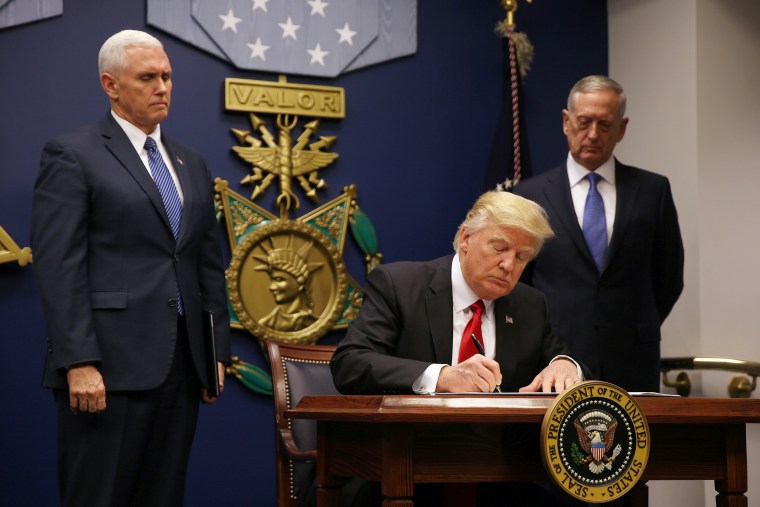The Trump administration on Thursday asked the U.S. Supreme Court to allow the president’s blocked "travel ban" order to take effect, following a defeat at an appeals court last week.
The Justice Department urged the Supreme Court to allow it to enforce the executive order now, while the justices consider whether to hear the appeal.
It also asked the court to fast-track the case, which could result in the justices hearing it before its new term begins in the fall. The court normally disposes of all pending cases by the end of June.
“We have asked the Supreme Court to hear this important case and are confident that President Trump's executive order is well within his lawful authority to keep the nation safe and protect our communities from terrorism," Justice Department spokesperson Sarah Isgur Flores said.
"The President is not required to admit people from countries that sponsor or shelter terrorism, until he determines that they can be properly vetted and do not pose a security risk to the United States," she said.
Thursday's move was a certainty after a federal appeals court last week voted to uphold a ban on enforcement that was imposed by a federal judge in Maryland. Another appeals court, on the west coast, has yet to rule on whether to uphold a similar ban issued by a federal judge in Hawaii.
After President Trump's first executive order was blocked in court, the president signed the second one. It would impose a 90-day ban on entry to the U.S. from Iran, Sudan, Syria, Libya, Somalia, and Yemen. It would also suspend for 120 days the refugee program.
The 4th Circuit U.S. Court of Appeals in Virginia ruled May 25 that the president's executive order is likely unconstitutional, because it's based on religious discrimination.
Statements made during the campaign, the court said, make it clear the executive order stems from "President Trump's desire to exclude Muslims from the United States."
But in their appeal Thursday, the Justice Department said determining what candidate Trump and his aides meant would require "judicial pscychoanalysis."
"The decision below is the first to hold that a provision of federal law — neutral on its face and in operation — violates the Establishment Clause based on speculation about its drafters' supposedly illicit purpose,” the Justice Department said.
Government lawyers also said that, at most, a ban on enforcement should apply only to a one of the challengers in the Maryland case, a man who seems to bring his Iranian wife to the United States. The lower courts were wrong, the Justice Department said, to apply the enforcement ban nationwide.
The justices will likely seek the views of the challengers before deciding whether to grant any of the government's requests.
Trump has said the order is necessary to protect Americans from terrorists. Critics have called it a "Muslim ban," something Trump has denied. Some former high-ranking U.S. diplomats and security officials have argued it would harm, not help, U.S. national security.
A federal judge in Hawaii has also blocked enforcement of the revised travel order. The 9th Circuit U.S. Court of Appeals heard arguments on May 15 on the government’s efforts to lift that stay.
Trump’s revised executive order dropped Iraq from the list of nations that would be affected, among other changes. After a federal judge blocked the revised order in March, Trump called it a “watered down” version of his first order.
The American Civil Liberties Union, which is representing a group of refugee aid organizations and Muslim residents whose overseas relatives are seeking visas, said on Twitter Thursday night that it would defend its victory.
"We've beat this hateful ban and are ready to do it again," the ACLU said.

